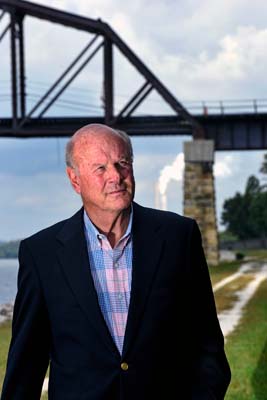"You don't know how to handle it"
Remembering the Silver Bridge Disaster
By Stan Bumgardner

Jimmy Joe Wedge revisits the site of the Silver Bridge Disaster in Point Pleasant 50 years later. Photo by Steve Brightwell.
Jimmy Joe Wedge was born in Fostoria, Ohio, in 1942. Early in life, he and his family moved to Point Pleasant. It was a bit of a homecoming for his father, Paul, a native of Mud Sock in Jackson County.
Point Pleasant was a bustling town during World War II. The U.S. government built an ordnance work north of town to make TNT. Older plants run by Sylvania and Quality Manufacturing also got a boost during the defense build-up.
But the town’s primary lifeblood during the war years was Marietta Manufacturing. Originally founded in Marietta, Ohio, in 1853, the company moved to Point Pleasant and started operations in 1916, making stoves, capstans, and other equipment for steamboats. During World War II, Marietta dramatically ramped up production, hiring some 3,000 workers (nearly doubling Point Pleasant’s population during the war). By the war’s end, Marietta had cranked out 53 large tugs and 16 mine planters for the Army and four net tenders for the Navy.
Paul Wedge got one of those 3,000 jobs, eventually becoming an expert boilermaker. He later became a professional union organizer.
“He was a union man,” Jimmy says. “For instance, we weren’t allowed to shop at the A&P because it was built with nonunion labor.”
Jimmy’s mother, Lillian, was a stay-at-home mom, living with six others in a three-bedroom house—with one bathroom. Like most moms, she had her hands full all the time. Lillian would get up before the crack of dawn, drink two pots of coffee, and do everything that needed to be done to get “Toodles,” Denny, Dick, Betsy, and Jimmy off to school on time—Jimmy doesn’t ever remember going to school with wrinkled clothes. And Lillian not only raised her own children but also played a patient host to a constant flow of stayover guests.
The family saying, Jimmy says, was, “How would Lill handle this?
Jimmy graduated from Point Pleasant High School in 1960 and went to West Virginia University, where he earned a spot on the freshman basketball team. He got married and moved back to Point Pleasant for a chance at his dream job: coaching basketball at his alma mater. During the 1966-67 season, he was an assistant coach. The next season, he was named head coach, and his first home game was scheduled against Ripley High School—for the evening of December 15, 1967.
In recent years, Paul had been spending most of his time in Kansas City, where he was a vice president for the International Brotherhood of Boilermaker. He’d made the long trip east from Kansas City to West Virginia to see his son’s first home game as head coach.
Jimmy and his family don’t know all the exact details of December 15, 1967. The best they can figure, his parents had gone to eat at Bob Evans Restaurant—the original, one-and-only Bob Evans back then—in Rio Grande, Ohio, only miles from Point Pleasant. After dinner, they were returning across the Silver Bridge for the game, hauling a Christmas tree in tow. That’s when the bridge collapsed.
At the moment of the disaster, Jimmy was in his apartment 10 blocks away. His first son was less than a year old.
“I heard a big snap,” Jimmy remembers, “like someone cracking a whip.”
He knew Marietta Manufacturing (which was still in business on a much smaller scale) made a lot of noise moving large sheets of steel, but this was something different—something he’d never quite heard before. Jimmy soon heard police sirens, lots of them. Preparing for the game, his first instinct wasn’t about the bridge; rather, he was worried that earlier rains might cause travel problems for the Ripley squad. So, he drove downtown to check on the water level.
“I’m driving down Main Street and look to my left down Sixth Street. I can’t see the river because of the flood wall, but I can’t see the bridge, either. It was getting dark, but I still should’ve seen it. I turned at the next cross street, which cut through the flood wall, and immediately see that the bridge is gone.”
You can read the rest of this article in this issue of Goldenseal, available in bookstores, libraries or direct from Goldenseal.